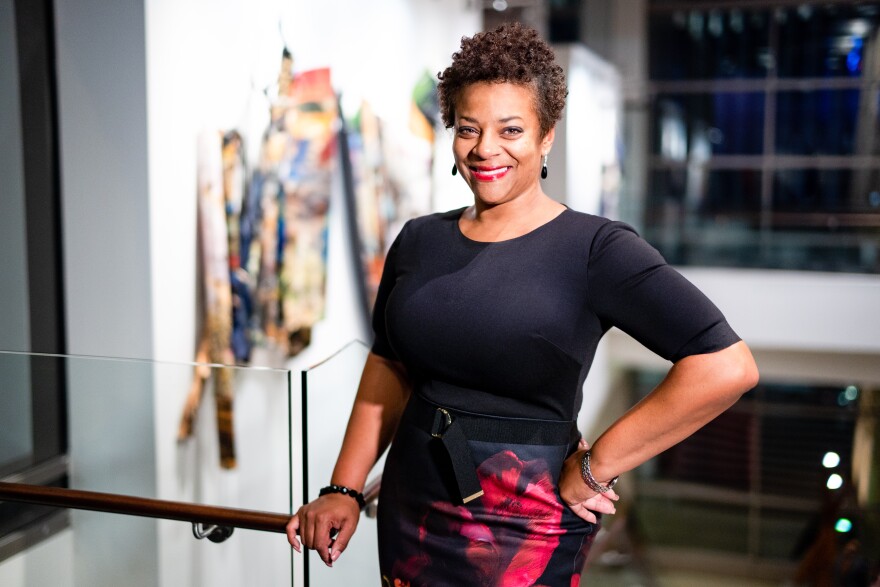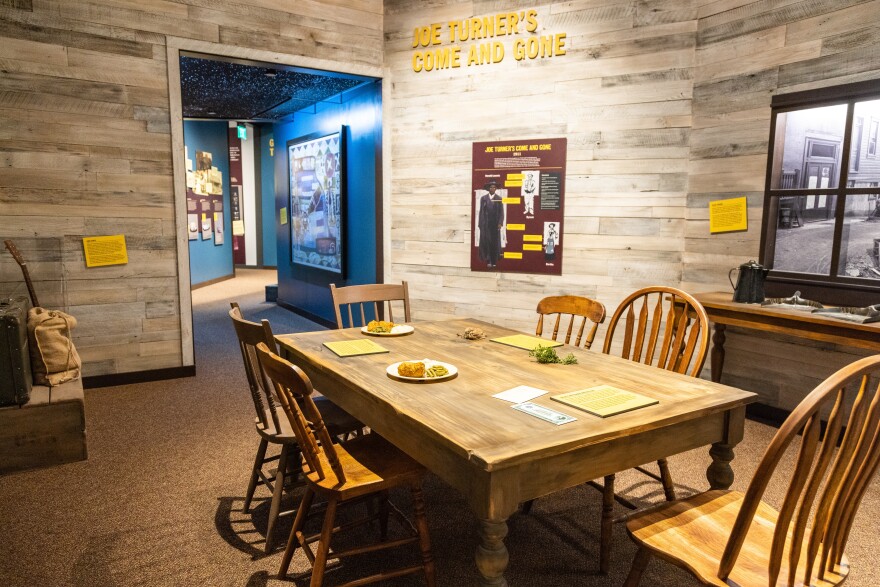Few Pittsburgh-born artists have had as great an impact on their fields as did playwright August Wilson, who won the first of his two Pulitzer Prizes for drama in 1987 and died in 2005. Yet until last week, there was been no single site in his hometown where visitors and other fans could go to absorb the breadth of his legacy as a chronicler of the Black American experience through his monumental, 10-play American Century Cycle.

That changed April 16, with the opening of “August Wilson: The Writer’s Landscape,” a permanent immersive and interactive exhibition at – where else? – Pittsburgh’s August Wilson African American Cultural Center. The Center, which opened in 2009, is located just a half-mile from the brick rowhouse that was Wilson’s own first home in the Hill District.
The expansive, 3,600-square-foot exhibit was four years in the making and cost about $3 million to realize, said president and CEO Janis Burley Wilson, who oversaw the project from start to finish. It’s just the latest honor in the theatrical giant’s legacy, and one that the organization hopes will become an international attraction.
“It was important to have a site where people could walk and immersed in August Wilson’s work, learn about his influences, learn about how he worked and why he did the things that he did, why he wrote about specific topics in a specific way,” said Burley Wilson at a press preview last week.
“Writer’s Landscape” consists of 13 separate walk-through installations. Ten are devoted to the works in the Century Cycle, each of which is set in a different decade of the 20th century, exploring the damage wrought by racism as well as resilience and triumphs of Black Americans. Most spotlight working-class characters like trash collectors (“Fences”), recent migrants from the agricultural South (“The Piano Lesson”), blues musicians (“Ma Rainey’s Black Bottom,” “Seven Guitars”), mill workers (“Gem of the Ocean”), and unlicensed cab drivers (“Jitney”).

All 10 plays made it to Broadway; “Fences” and “The Piano Lesson” won Pulitzers. And all but one of the plays are set in the Hill District, where Wilson partly grew up and then came of age as a young man. The installations feature Wilson’s personal effects along with costumes, props, and more from productions of the plays, including a 1956 Rock-Ola jukebox from the 1990 Broadway staging of “Two Trains Running.” There are also short videos about each play, with historical context given, and dialogue performed, by the likes of such Wilsonian actors as Phylicia Rashad and Ruben Santiago-Hudson. Another installation honors Wilson’s autobiographical monologue, “How I Learned What I Learned.”
Two other exhibit “scenes” summon his writing life. One is a diner-themed installation inspired by Eddie’s Restaurant, a now-vanished Hill District haunt of Wilson’s in the 1960s and ’70s; Wilson, famously, did a lot of writing in diners. “The Office,” meanwhile, recreates his home office, complete with big writing wooden desk, books, and favorite blues records on vinyl – all donated by his wife, Constanza Romero-Wilson, from the couple’s residence, in Seattle, where Wilson lived the final 15 years of his life.
Romero-Wilson, who heads the August Wilson Legacy LLC, served as the exhibit’s chief curator. She was in town to attend the preview and Friday’s ribbon-cutting. She said The Office was her favorite part of the show.
“I can almost feel him when I am in the room,” said Romero-Wilson.
Wilson's Pittsburgh years

August Wilson’s rise to international theatrical fame was unlikely, to say the least. He was born Frederick August Kittel. His father was a German immigrant whom Wilson never really knew; he and his five siblings were raised by their mother, Daisy Wilson, who moved them to another neighborhood, Hazelwood, in the 1950s, after she remarried.
August attended Central Catholic High School and Gladstone High School, but dropped out of the latter, at age 15, after a teacher accused him of plagiarizing a paper he’d written on Napoleon. While that concluded his formal schooling, he began spending his days at the Carnegie Library of Pittsburgh’s main branch, in Oakland, reading everything he could.
“He was an autodidact,” said Romero-Wilson, herself an artist and costume designer. “He read incessantly. And he always tried to perfect everything and he was his own best critic. So that persistence to me, and the triumph of his life, is what I want people to see when they come to this exhibit.”
In 1965, at age 20, Wilson adopted his mother’s maiden name and declared himself a poet. The newly minted “August Wilson” had moved back to a Hill District devastated by redevelopment projects like the razing of the Lower Hill to make way for Pittsburgh’s Civic Arena, a sports and concert venue. But as “Writer’s Landscape” makes clear, he still found boundless inspiration there, in the people he met while hanging out (and taking notes) in coffee shops, cigar stores, and jitney-cab stations.

“He grew up observing the people here. Hearing the way they speak, their tonality, their musicality,” said Romero-Wilson. “He picked up the philosophy about right and wrong, about justice, about race, all here, with the people of Pittsburgh. So the spirit of Pittsburghers lives in all of August’s plays.”
The exhibit also evokes other formative influences through touch-free interactive video and audio displays. In archival interview clips, for instance, Wilson discusses the importance of such keystones of his worldview as the Black-power movement and blues music. (Other influences include the art of fellow one-time Pittsburgher Romare Bearden, and the work of Argentinian poet and fiction writer Jorge Luis Borges.)
Wilson got into theater through his association with playwright Rob Penny, scholar Vernell Lillie, and others in Pittsburgh’s Black arts community. But while he began writing plays in the ’70s, every entry in the Century Cycle (sometimes called the Pittsburgh Cycle) was completed after he left town, for St. Paul, Minn., in 1978.
“Ma Rainey” was his first play to head to Broadway, in 1984; nine more followed, concluding with 2003’s “Gem of the Ocean” (set in 1904) and 2005’s “Radio Golf” (set in 1997).
“Radio Golf” premiered just months before his death, at age 60, of liver cancer.
Sandra Shannon, a leading Wilson scholar who contributed to “Writer’s Landscape,” said Wilson’s reputation has only grown since. “The world began to recognize his greatness, and define his greatness in terms, not just financially, but also in his ability to capture the stories of an entire people,” said Shannon, a professor emerita at Howard University and president of the August Wilson Society.
Recognition and preservation
Wilson’s importance to Black theater artists is likewise massive, said Ruben Santiago-Hudson, a nationally known stage and screen actor who has performed in and directed numerous productions of Wilson plays on and off-Broadway. “Instead of Black life being in the periphery, he put Black people’s lives in … the center of what is Americana,” said Santiago-Hudson, who also scripted the 2020 screen adaptation of “Ma Rainey’s Black Bottom.”
“He was huge in his ideas and his thoughts, in creating a space for us,” he adds. “So we didn’t need permission to be a part of America. With August Wilson, we are America.”
Wilson’s reputation continues to grow, in large part thank to actor Denzel Washington’s commitment to bring each installment of the Century Cycle to the big screen. The project began with Washington and Viola Davis starring in 2017’s “Fences,” and continued with Davis’ turn as Ma Rainey in a 2020 adaptation.
“More people saw ‘Fences’ the movie than saw ‘Fences’ on Broadway,” said Romero-Wilson. “I welcome that.”
More Wilson is on its way. This fall, LaTanya Richardson Jackson directs a Broadway revival of “The Piano Lesson,” starring John David Washington, Danielle Brooks, and Samuel L. Jackson.
In Pittsburgh – already home to August Wilson’s archives, at the University of Pittsburgh – the playwright’s childhood home, the August Wilson House, is getting closer to its rebirth as an arts center.
“It’s beyond my imagination how important August has become in our consciousness, in our American consciousness,” said Romero-Wilson.
“The Writer’s Landscape” exhibit has special resonance for Black theater artists in Wilson’s hometown. “I think it’s gonna really bring a lot of pride to a lot of Pittsburghers, especially older Pittsburghers,” said Mark Clayton Southers, a Hill District native whose small but resourceful Pittsburgh Playwrights Theatre Co. has staged all 10 Century Cycle plays.
Southers, who consulted on “Writer’s Landscape,” traces his own award-winning playwriting career to seeing Wilson speak, in 1998. He’s also directed numerous productions of Wilson plays at regional theaters around the country.
He hopes the exhibit will encourage visitors to explore Wilson beyond his best-known work. “I think it’ll just get them eager to see more plays,” he said.
Admission to the exhibit is free. More information is here.














